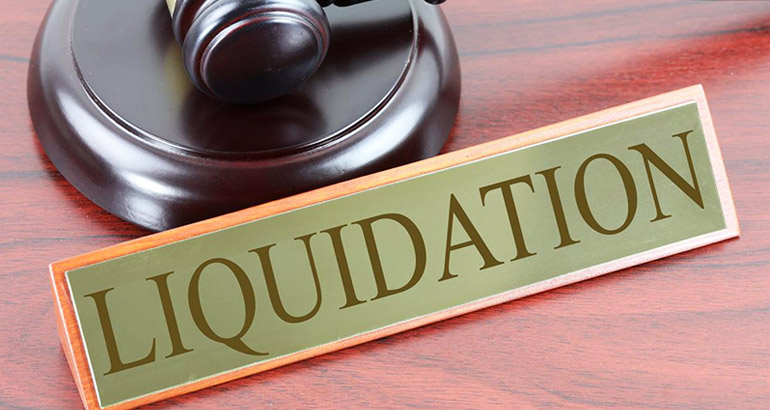Little Known Questions About Company Liquidation.
Little Known Questions About Company Liquidation.
Blog Article
Company Liquidation Can Be Fun For Everyone
Table of ContentsHow Company Liquidation can Save You Time, Stress, and Money.The 6-Second Trick For Company LiquidationIndicators on Company Liquidation You Need To KnowOur Company Liquidation DiariesWhat Does Company Liquidation Do?
A liquidator is specifically designated to supervise the ending up of a business's events in order for it to be folded usually when the company is declaring bankruptcy. The liquidator is an unbiased 3rd party who looks after the sale of firm assets in order to settle any kind of exceptional debts.Their function includes, however is not limited to: Objective Overseer: A liquidator is tasked with working as a neutral 3rd party to look after the entire firm liquidation procedure. Produce Statement of Matters: Liquidators need to produce a thorough declaration of affairs record. This record is dispersed to financial institutions, outlining the existing financial status of the company at the time of its liquidation.
After the liquidation of a business, its existence is removed from Firms Home and it stops to be a legal entity. If supervisors navigated the procedure without problem, there would be no penalties or individual obligation for solid debts anticipated. Now, with a fresh start, supervisors can check out brand-new service chances, though specialist appointment is advisable.
The Single Strategy To Use For Company Liquidation
For instance, if greater than 90% of all firm shareholders concur, liquidation can take location on short notice within seven days, the minimal legal notification for financial institutions. Usually, the bigger the liquidation and the more properties and funding the company has, the longer the process will certainly take. 'Do I have to pay to liquidate my firm?', the answer will certainly depend on whether your organization has any type of properties remaining when liquidating.

We comprehend that no two firms are the same, which is why we will make the effort to learn more about your service so we can suggest the very best strategy for you. We just operate in your benefits, so you can be totally confident in the service we provide.
Company Liquidation for Beginners
In the UK, there is an established procedure to closing down or restructuring a minimal business, whether it is solvent or insolvent. This procedure is referred to as liquidation and can just be managed by a certified bankruptcy that site professional (IP) based on the Bankruptcy Act 1986. There are four main kinds of company liquidation procedure: Creditors' Volunteer Liquidation (CVL); Mandatory liquidation; Management; and Members' Volunteer Liquidation (MVL).

In these situations, it is necessary that the firm stops trading; if the business proceeds to trade, the directors could be held personally responsible and it might result in the bankruptcy practitioner reporting wrongful trading, referred to as misfeasance, which might result in lawful action. The supervisors designate an insolvency expert and when this has actually been agreed and validated, there is learn this here now a meeting with the investors.
The supervisors are no much longer entailed in what takes place, consisting of the sale of the company's assets. If the directors want any of the possessions, they can inform the IP.
Company Liquidation Fundamentals Explained
The primary difference is that the company's creditors related to the court for a winding up order which compels the financially troubled firm right into a liquidation process. Lenders take this action as a last hotel because they haven't received settlement with other kinds of negotiation. The court designates an insolvency practitioner, additionally understood as an official receiver, to carry out the mandatory company liquidation procedure.
This kind of company liquidation is not volunteer and directors' conduct is reported to the UK's Assistant of State once the liquidation process has been completed. Any kind of supervisor that fails to cooperate with the IP or has been included in director transgression, or an illegal act, might result in significant consequences.
It is made use of as a method to protect the business from any lawsuit by its lenders. The directors of the business accept make regular settlements to settle their debts over an amount of time. The selected administrator manages the voluntary management procedure, and receives the settlements which they after that disperse to financial institutions according to see post the agreed amounts.
Company Liquidation Fundamentals Explained
This gives the firm with time to create a strategy going ahead to rescue the firm and stay clear of liquidation. Nonetheless, now, supervisors hand control of the business over to the designated administrator. If a business is solvent but the directors and investors wish to shut business, a Members Voluntary Liquidation is the right alternative.
The business liquidation process is handled by a liquidator selected by the directors and investors of the business and they should authorize a declaration that there are no lenders remaining. The liquidation procedure for an MVL is comparable to that of a CVL in that properties are know however the earnings are distributed to the supervisors and the investors of the company after the liquidator's costs have been paid.
Report this page